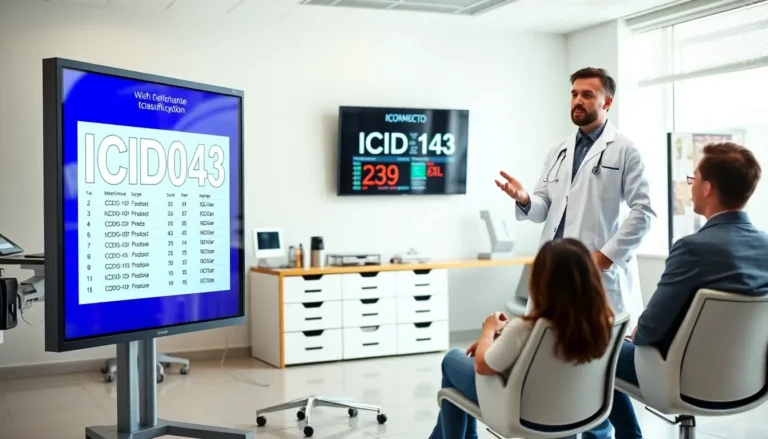Table of Contents
ToggleIn today’s digital classroom, where every click can feel like a public performance, privacy in education tech has become the hot topic on everyone’s lips. Picture this: students sharing their deepest thoughts in an online forum, unaware that their data might be more exposed than a high school crush’s diary. With educational apps and platforms booming, it’s crucial to navigate this tech-savvy landscape without losing sight of privacy.
Overview of Privacy in Education Tech
Privacy in education technology remains a critical topic as more students engage with digital learning tools. Data collection occurs frequently, often without users fully understanding what information is gathered. Educators and institutions face challenges in balancing the benefits of technology with the need to protect student data.
Many educational apps collect personal information. This information includes names, email addresses, and even academic records. With the rise of remote learning, the potential for data breaches increases. Schools must implement strong privacy policies and secure platforms to safeguard sensitive data.
Compliance with regulations like FERPA and COPPA is essential for educational organizations. These laws protect the privacy of student data and restrict data sharing and collection practices. Organizations that ignore these regulations may face legal consequences and damage their reputations.
Students and parents play crucial roles in education privacy. Awareness of privacy settings helps users make informed decisions about what information to share. Educational institutions must provide clear guidelines and resources to enhance awareness and support privacy measures.
Transparency in data use is vital for fostering trust. Users should know how their data is used, stored, and shared. Regular communication about data-handling practices can build confidence in educational technologies.
Adopting robust security measures is a proactive step. Implementing encryption, secure passwords, and two-factor authentication can help protect sensitive information. Continual training for staff and students on data privacy practices is necessary. Enhanced vigilance ensures a safer learning environment for everyone.
Importance of Privacy in Educational Settings
Privacy in education technology plays a crucial role in safeguarding sensitive student information. As digital learning tools gain popularity, protecting data becomes increasingly important.
Protecting Student Data
Safeguarding student data involves implementing strong security measures. Schools and educational institutions must use secure platforms that comply with regulations like FERPA and COPPA. Data breaches can arise from inadequate protections, making security practices essential. Many educational apps collect personal information, including names, email addresses, and academic records. Educators should educate students and parents about privacy settings to enable informed decisions regarding information sharing. Regular updates on the latest data protection technologies enhance overall security.
Maintaining Trust Among Stakeholders
Maintaining trust among stakeholders hinges on transparency regarding data use. Continuous communication about data-handling practices fosters confidence in educational technologies. Schools can cultivate a culture of trust by prioritizing privacy and sharing comprehensive policies. Educators, parents, and students all benefit from a collaborative approach to data privacy. Stakeholders should feel secure knowing their data is protected. Moreover, encouraging active participation in privacy-related discussions strengthens community ties and promotes a collective commitment to student safety.
Current Privacy Challenges in Education Tech
Privacy issues in education tech arise from various sources, primarily focusing on data breaches and regulatory compliance. These challenges necessitate immediate attention from stakeholders.
Data Breaches and Security Risks
Educational technologies often lack robust security measures, making them susceptible to data breaches. Cybercriminals target platforms that store sensitive student information, such as personal details and academic records. High-profile incidents highlight the vulnerabilities in these systems. Educators and institutions must invest in secure platforms to protect against unauthorized access. Strong encryption methods and regular security audits significantly reduce risks. Students deserve protection from the potential fallout of compromised data, emphasizing the need for ongoing vigilance in privacy protection.
Regulatory Compliance Issues
Navigating regulatory requirements poses significant challenges for educational organizations. Compliance with laws like FERPA and COPPA ensures the safeguarding of student data, but many institutions struggle to meet these standards. Understanding these regulations requires proper training for staff and administrators. They must establish comprehensive privacy policies that align with legal requirements. Regular reviews of these policies enhance adherence and awareness among educators. Failure to comply can result in legal consequences, making it critical to prioritize these regulations. Engaging stakeholders further strengthens the commitment to maintaining data privacy in education tech.
Best Practices for Ensuring Privacy
Maintaining privacy in education technology requires proactive measures. Educational institutions must prioritize data protection and educate all stakeholders.
Implementing Strong Data Protection Measures
Institutions should implement robust data protection measures to safeguard sensitive information. Encryption methods offer strong security for data in transit and at rest, minimizing the risk of unauthorized access. Regular security audits help identify vulnerabilities and reinforce security protocols. Educators must enforce policies that restrict access to personal data, limiting it only to necessary personnel. Using secure platforms reduces exposure to potential breaches, ensuring information remains confidential. When staff understands data protection practices, they contribute to a more secure environment for students.
Educating Stakeholders on Privacy Concerns
Awareness of privacy concerns empowers students and parents to make informed decisions. Schools should provide resources that detail privacy settings on educational platforms. Regular workshops can address how data is collected, shared, and used. Engaging stakeholders fosters a community committed to data protection. Transparency builds trust and encourages discussions about privacy. Training staff on regulations like FERPA and COPPA ensures compliance while raising awareness of potential legal consequences. By creating an informed environment, institutions promote better privacy practices in education technology.
Future Trends in Privacy for Education Tech
Educators and institutions must stay vigilant as privacy concerns evolve in education technology. Emerging technologies like artificial intelligence and machine learning will impact data handling practices. Increased reliance on cloud services mandates stronger security protocols to protect student information.
With more schools adopting personalized learning platforms, data collection will likely escalate. This trend emphasizes the need for comprehensive privacy policies that outline data usage clearly. Institutions should prioritize transparency to build trust with students and parents regarding data management.
Innovations in encryption technologies will play a crucial role in safeguarding sensitive data. Secure data storage solutions must become commonplace to prevent unauthorized access. Regular audits of security measures will ensure compliance with regulations.
The increasing use of educational software raises questions about user consent for data collection. Institutions must provide clear options for students and parents to understand their rights. This proactive approach to user consent fosters a culture of accountability in educational settings.
Training educators on privacy regulations like FERPA and COPPA will support compliance efforts. Ongoing professional development in data privacy practices is vital for maintaining effective policies. Encouraging an environment where staff, students, and parents engage in discussions about privacy enhances awareness.
Finally, emerging privacy-preserving technologies, such as differential privacy, may offer solutions to balance data utility and security. Implementing these technologies can help educators utilize data without compromising student safety. Stakeholders must champion these practices to cultivate a secure educational landscape.
The landscape of education technology is rapidly evolving and with it, the importance of privacy cannot be overstated. As digital tools become integral to learning, the responsibility to protect student data falls on educators, institutions, and families alike. A proactive approach to data protection is essential for fostering a secure environment.
Investing in robust security measures and ensuring compliance with regulations like FERPA and COPPA will help mitigate risks. Transparency in data practices builds trust among students and parents, encouraging a culture of awareness and responsibility. As technology advances, ongoing education about privacy will remain crucial in safeguarding sensitive information while enhancing the learning experience. Prioritizing privacy is not just a necessity; it’s a commitment to creating a safe and effective educational space for all.







